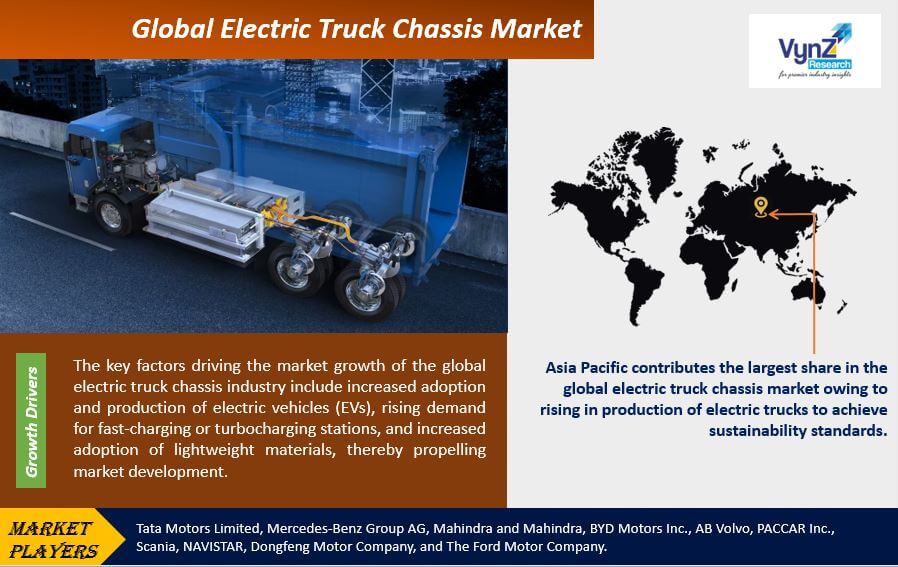| Status : Published | Published On : Apr, 2024 | Report Code : VRAT9627 | Industry : Automotive & Transportation | Available Format :

|
Page : 230 |

Global Electric Truck Chassis Market – Analysis and Forecast (2025-2030)
Industry Insight by Number of Axles (Double-Axle Chassis, Tri-Axle Chassis, Four-Axle Chassis, and Others), by Chassis Material (Aluminum Alloy, Mild Steel, High-Speed Steel, and Others), by Chassis Type (Backbone Chassis, Ladder Chassis, Monocoque Chassis, Modular Chassis, and Others), by Truck Classification (Light Duty (Class 1 to Class 2), Medium Duty (Class 3 to Class 6), and Heavy Duty (Class 7 & Class 8)), by Installation (Company-Fitted and Retrofitted), and Geography (North America, Europe, Asia-Pacific (APAC), Rest of the World (RoW))
Industry Overview
The Global Electric Truck Chassis Market size was estimated to grow from USD 0.4 billion in 2023 to USD 5.1 billion by 2030. It will register a CAGR of 32.5% during the forecast period. The chassis is an essential component of the vehicle, also referred to as the vehicle's support structure or frame. The chassis is essential for maintaining the drive’s comfort and structural component durability. Compared to conventional combustion engines, electric truck chassis offer a platform that is more stable, effective, quieter, cleaner, and safe. Electric truck chassis can be tailored according to specific applications such as regional distribution centers, long-distance transportation, or even heavy construction sites. The chassis serves as the framework that holds everything together. Thus, it is a frame that serves as mounting points for additional parts like the controller, motor, and battery.

Rising concerns about pollution, particularly from automobiles, have compelled governments in several countries to take some measures to keep regional or national pollution under control. As a result, investments in alternative fuels and electric vehicles are increasing.
Electric Truck Chassis Market Segmentation
Insight by Number of Axles
Based on the Number of Axles, the Global Electric Truck Chassis Market is segregated into Double-Axle Chassis, Tri-Axle Chassis, Four-Axle Chassis, and Others. Double Axle Chassis is expected to have significant growth during the forecast period to enhance energy efficiency and drive sustainability.
Insight by Chassis Material
Based on Chassis Material, the Global Electric Truck Chassis Market is divided into Aluminum Alloy, Mild Steel, High-Speed Steel, and Others. Aluminum Alloy is expected to have the fastest growth owing to the increased adoption of strong and lightweight solutions as the government is emphasizing minimizing CO2 emissions.
Insight by Chassis Type
Based on Chassis Type, the Global Electric Truck Chassis Market is segmented into Backbone Chassis, Ladder Chassis, Monocoque Chassis, Modular Chassis, and Others. The monocoque chassis segment is expected to have the fastest growth owing to the increased adoption of electric vehicles. It offers less emission and makes vehicles safe and fuel-efficient.
Insight on Truck Classification
Based on Truck Classification, the Global Electric Truck Chassis Market is segregated into Light Duty (Class 1 to Class 2), Medium Duty (Class 3 to Class 6), and Heavy Duty (Class 7 & Class 8). Medium Duty is expected to have a high CAGR during the forecast period as medium-sized trucks are increasingly deployed to transport goods for short distances. Moreover, the mounting investment in logistics, infrastructure, e-commerce, and construction sector will propel the market demand for medium-sized electric trucks globally. The BYD 6F is the world's first commercially available all-electric class 6 cab and chassis capable of traversing an entire route.
Insight by Installation
Based on Installation, the Global Electric Truck Chassis Market is bifurcated into Company-Fitted and Retrofitted. Company-fitted dominates the market. Truck manufacturers are manufacturing electric vehicles in response to an increase in government measures to phase out conventional trucks and replace them with zero-emission alternatives.
Global Electric Truck Chassis Market Report Coverage
|
Report Metric |
Details |
|
Historical Period |
2018 - 2023 |
|
Base Year Considered |
2024 |
|
Forecast Period |
2025 - 2030 |
|
Market Size in 2024 |
U.S.D. 0.4 Billion |
|
Revenue Forecast in 2030 |
U.S.D. 5.1 Billion |
|
Growth Rate |
32.5% |
|
Segments Covered in the Report |
By Number of Axles, By Chassis Material, By Chassis Type, By On Truck Classification,By Installation |
|
Report Scope |
Market Trends, Drivers, and Restraints; Revenue Estimation and Forecast; Segmentation Analysis; Impact of COVID-19; Companies’ Strategic Developments; Market Share Analysis of Key Players; Company Profiling |
|
Regions Covered in the Report |
North America, Europe, Asia-Pacific (APAC), Rest of the World (RoW) |
Industry Dynamics
Electric Truck Chassis Market Growth Drivers
The key factors driving the market growth of the global electric truck chassis industry include increased adoption and production of electric vehicles (EVs), rising demand for fast-charging or turbocharging stations, and increased adoption of lightweight materials, thereby propelling market development. Moreover, the rising demand for fuel-efficient vehicles, as well as an increase in electric vehicle sales, are expected to drive the Electric Truck Chassis Market in the coming years.
Also, the government’s emphasis on minimizing CO2 emissions has prompted the development of strong and lightweight electric vehicle chassis that is made of aluminum and carbon fiber composites for mounting electric motors and batteries. Furthermore, the rising vehicle emissions have forced the government to emphasize providing funds to electric vehicles, thereby driving the market growth of the global electric truck chassis industry.
Electric Truck Chassis Market Challenges
The initial investment in manufacturing electric trucks is high as compared to petroleum, CNG, or diesel trucks. Also, the prices of parts and machinery used for production are high, thereby hampering the market development of the global electric truck chassis industry.
Electric Truck Chassis Market Opportunities
The industry players have ample market opportunities in the global electric truck chassis industry which include:
- Increased research and development activities
- The surge in adoption of connected, autonomous, and shared mobility devices
- Development of Ultra-Light Chassis systems
Electric Truck Chassis Market Geographic Overview
- North America
- Europe
- Asia Pacific (APAC)
- Rest of the World (RoW)
Asia Pacific contributes the largest share in the global electric truck chassis market owing to the rise in the production of electric trucks to achieve sustainability standards. The key industry players in the electric truck chassis industry are spending on research and development activities to improve their market share. China, one of the world's largest vehicle manufacturers, dominates the global electric truck market as a result of increased government support and grants for the electrification of the country’s transportation sector.
Electric Truck Chassis Market Competitive Insight
The global electric truck chassis industry is in its early stages, and it is dominated by established and new joint venture companies. Key players are working to develop novel and more innovative technologies to increase their market share of electric truck chassis. To remain competitive in the market, they are also developing strategies like collaboration, partnership, and M&A to sustain themselves in the market.
Mercedes-Benz Group AG (formerly Daimler AG) is one of the most successful automotive companies in the world. They are one of the world's leading suppliers of premium and luxury cars and vans. Mercedes-Benz Mobility AG provides financing, leasing, car subscription and rental, fleet management, charging and payment digital services, insurance brokerage, and innovative mobility services. Mercedes-Benz Trucks is driving the transportation industry's transition to CO2-neutral drive systems while also focusing on e-trucks in its supply chain. The truck manufacturer has set an ambitious goal of electrifying 100 percent of delivery traffic to its largest truck plant in Worth, Germany, by the end of 2026, thereby making a significant portion of the direct supply chain CO2-neutral.
Scania's Electric Trucks are completely emission-free. They are offering battery electric trucks that are available as a rigid truck and a trailer tractor, thus offering brand new drivelines, enhanced batteries, and more powerful charging capabilities, 350 km range at 40 tonnes and 250 km range at 64 tonnes max GTW. Scania's battery packs are now assembled in-house to perfectly fit both the strengthened chassis and the new charging interface placement - on the left-hand side behind the driver door.
Recent Development by Key Players
BYD has launched its first pickup truck, BYD SHARK, in Mexico. BYD SHARK features the DMO Super Hybrid Off-road Platform, representing the latest addition to BYD's product portfolio, as it is positioned as a new energy intelligent luxury pickup. This model is developed for the global market that marks BYD's first global product launch outside of China.
The Mercedes has launched Mercedes eActros 600 Long-Haul Semi on road with 311 miles of range and a 621 kWh battery. Several manufacturers are working on how to charge up the vehicles we use to haul goods as well as the world looks towards electrifying the way we travel.
Key Players Covered in the Report
Some of the major players operating in the global electric truck chassis market include Tata Motors Limited, Mercedes-Benz Group AG, Mahindra and Mahindra, BYD Motors Inc., AB Volvo, PACCAR Inc., Scania, NAVISTAR, Dongfeng Motor Company, and The Ford Motor Company.
The Electric Truck Chassis Market report offers a comprehensive market segmentation analysis along with an estimation for the forecast period 2025–2030.
Segments Covered in the Report
- By Number of Axles
- Double Axle Chassis
- Tri Axle Chassis
- Four Axle Chassis
- Others
- By Chassis Material
- Aluminum Alloy
- Mild Steel
- High-Speed Steel
- Others
- By Chassis Type
- Backbone Chassis
- Ladder Chassis
- Monocoque Chassis
- Modular Chassis
- Others
- By Truck Classification
- Light Duty Class 1 to Class 2
- Medium Duty Class 3 to Class 6
- Heavy Duty Class 7 and Class 8
- By Installation
- Company Fitted
- Retrofitted
Region Covered in the Report
- North America
- U.S.
- Canada
- Mexico
- Europe
- Germany
- U.K.
- France
- Italy
- Spain
- Russia
- Rest of Europe
- Asia-Pacific (APAC)
- China
- Japan
- India
- South Korea
- Rest of Asia-Pacific
- Rest of the World (RoW)
- Brazil
- Saudi Arabia
- South Africa
- U.A.E.
- Other Countries
.png)
To explore more about this report - Request a free sample copy
Frequently Asked Questions
Purchase Options
Latest Report
Research Methodology
- Desk Research / Pilot Interviews
- Build Market Size Model
- Research and Analysis
- Final Deliverabvle
Connect With Our Sales Team
- Toll-Free: 1 888 253 3960
- Phone: +91 9960 288 381
- Email: enquiry@vynzresearch.com
Electric Truck Chassis Market
